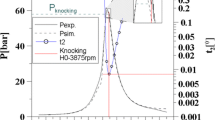Abstract
WORK on the effect of additives on the 'knock' -limited compression ratios of a wide variety of fuels has shown that there are at least two mechanisms whereby a fuel may 'knock'. One appears to correspond to the 'high' - and one to the 'low'-temperature ignition process discovered1 and thoroughly explored2 by Townend and his co-workers. Hydrocarbons such as benzene and methane, which Townend did not observe to give a 'low'-temperature ignition peninsula, 'knock' by the igh'-temperature process, and other hydrocarbons 'knock' by the 'low'-temperature process.
Similar content being viewed by others
References
Townend and Mandlekar, Proc. Roy. Soc., A, 141, 484 ( 1933).
See Newitt and Townend, "The Science of Petroleum", 4, 2884, 2958 ( 1938).
Chamberlain and Walsh, Symposium on Oxidation, Paris ( April 1948). Symposium on Combustion, Madison ( September 1948).
Townend, Chem. Rev., 21, 259 ( 1937).
Egerton, Smith and Ubbelohde, Phil. Trans. Roy. Soc., A, 234, 433 ( 1935).
Author information
Authors and Affiliations
Rights and permissions
About this article
Cite this article
DOWNS, D., WALSH, A. 'Knock' in Internal Combustion Engines. Nature 163, 370–371 (1949). https://doi.org/10.1038/163370a0
Issue Date:
DOI: https://doi.org/10.1038/163370a0
- Springer Nature Limited





